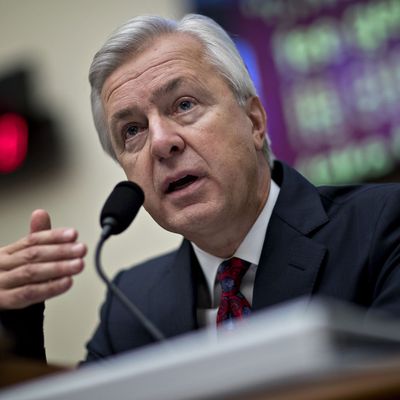
One of the many great things about being the CEO of a top Wall Street bank is that you can use your own ignorance as a get-out-of-jail-free card.
Since 2008, the Office of the Special Inspector General for the Troubled Asset Relief Program (or SIGTARP) has charged 86 bankers with crimes, putting 36 of them behind bars. One executive, Stephen G. Fields of Virginia’s Bank of the Commonwealth, received a sentence of more than 20 years for his “brazen greed and dishonesty.”
But in its eight years of existence, the obscure federal agency, which monitors crimes at companies that received taxpayer bailouts, has yet to reel in a single big fish. While SIGTARP has prosecuted top executives at small to midsize banks, it has never brought charges against the CEO of a Wall Street giant.
The reason? Those big kahunas can escape culpability by hiding behind their firms’ size and complexity. As long as these CEOs aren’t directly, certifiably privy to illegal acts, they can greet the Feds’ arrival by shouting, “I’m shocked — shocked — to find (highly profitable) fraud is going on in this bank.”
So, when Wells Fargo provided its customers with 2 million deposit and credit-card accounts they had never asked for, 5,000 employees were fired — but former CEO John Stumpf walked away with $134 million and no court date.
Christy Goldsmith Romero, special inspector general with the Troubled Asset Relief Program, wants to close off Stumpf’s escape route. Goldsmith Romero proposes that senior executives at bailed-out companies certify, every year, that they have performed “due diligence,” and found that no criminal activity or civil fraud is taking place within their organization.
This proposal “is the response to our years of finding it difficult to bring accountability to some of these banks,” Goldsmith Romero told the Washington Post in an interview. “Corporate culture should not allow crime and fraud to go unchecked.”
In her quarterly report to Congress, the inspector general anticipates the objection that no executive could possibly certify that nothing illegal was going on somewhere within an institution as large as Goldman Sachs or Wells Fargo.
“If a CEO says that their institution is too big or too complex to be able to certify about crime or fraud, then they have a much bigger problem,” she writes. “One that should be unacceptable, particularly at banks deemed so systemic that taxpayers bailed them out.”
Separately, Goldsmith Romero advised Congress to consider cutting Wells Fargo and Bank of America off from government foreclosure insurance. Both banks, along with many others, have repeatedly violated the rules of the Home Affordable Modification Program — the Obama administration’s primary effort to aid struggling homeowners in the wake of the financial crisis — by improperly denying homeowners access to the program or terminating their access to it without justification.
“If a homeowner doesn’t follow the rules in HAMP they get knocked out of the program,” Goldsmith Romero told the Post. “If a bank doesn’t follow they still get paid by Treasury.”






























